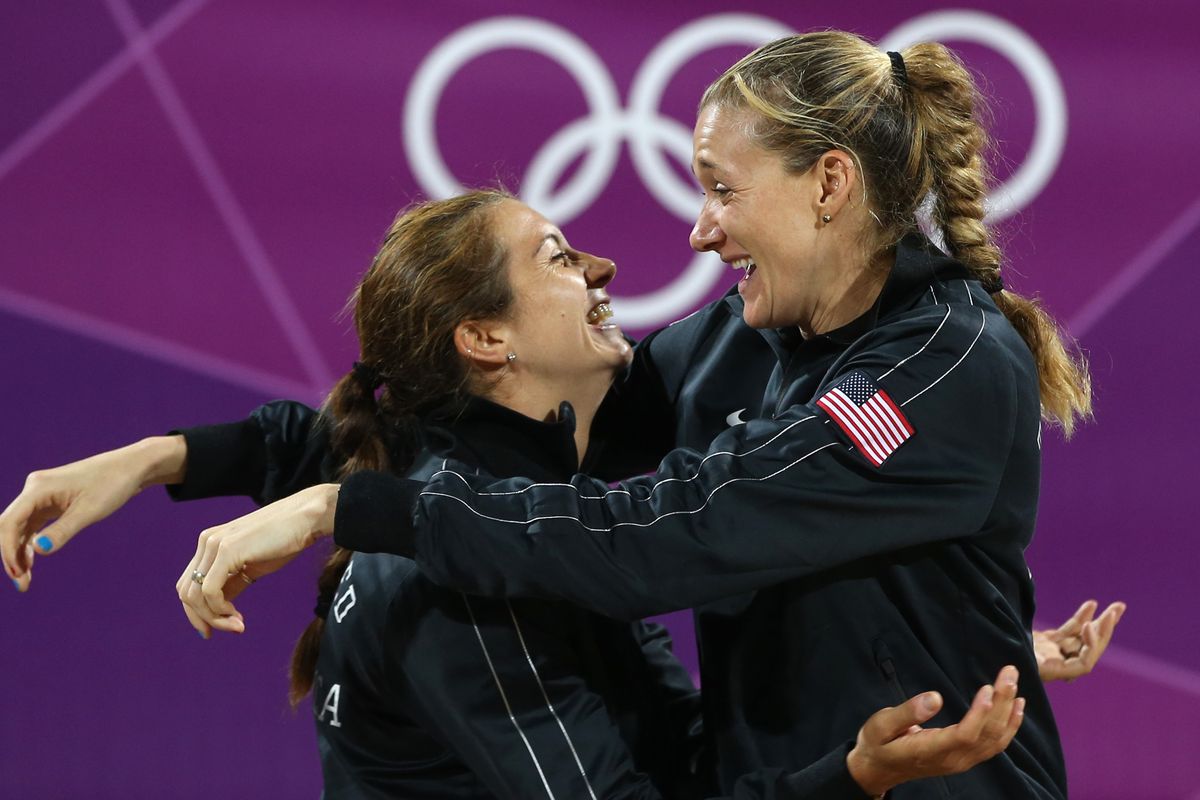All-U.S. beach volleyball final paints site red, white and blue

LONDON – On one edge of the court was Westminster Abbey. On another edge was 10 Downing Street. Towering in the distance was Big Ben.
In the middle were four bikini-clad women steeped in Southern California sand, playing a little pepper in Southern California’s trademark sport, digging and spiking for an Olympic championship.
On a wonderful night in confused old England, Manhattan Beach, Calif., broke out.
A sport that originated in Santa Monica, Calif., nearly a century ago gloriously bared its roots to the world Wednesday when two U.S. teams that honed their skills on the South Bay shores met for the women’s beach volleyball title on a spot where Henry VIII once jousted.
At the ancient Horse Guards Parade, the legendary beach team of Kerri Walsh Jennings and Misty May-Treanor defeated the upstart duo of Jennifer Kessy and April Ross in straight sets – 21-16, 21-16 – to win their third consecutive Olympic title.
May-Treanor celebrated by doing a beach shuffle across the sand. Walsh Jennings tearfully ran to the stands, reached up and grabbed her two young children in tears. Even the losing duo wrapped themselves in the flag and rollicked through the “USA!” cheers that showered them all.
“It feels like an out-of-body experience, kind of a numbness, like, ‘Oh my gosh, what just happened?’ ” May-Treanor said.
The night was so Southern California crazy, while the winning team was conducting its post-match interviews near the court, the floor underneath them collapsed as if ripped apart by an earthquake.
“I’m overwhelmed,” said Walsh Jennings, her eyes still red shortly after the medal ceremony. “It was truly a family journey.”
A big part of that family are the Southern California communities that spawned the competitors. Three of the women were born, raised and attended college in the Southland, while Walsh Jennings trains there. On any summer weekend, you can still find them working out in Manhattan Beach and Hermosa Beach.
“I hope when we come home to the tournament in Huntington Beach, a gazillion people are there because of what we’ve done,” Ross said.
No matter how widespread the sport has become since joining the Olympics in 1996 – Brazil and Australia won the first two women’s gold medals – it’s still basically a Southern California game, which made Wednesday so symbolically perfect. Rarely has a championship in such a worldwide enterprise come down to four women who hang out in the same area code. While the U.S. men and women have won six of 10 possible Olympic titles, Wednesday was the first time two American teams have met for the gold.
Even the British attempts to imitate the sport’s trappings couldn’t alter the fact that this could have been a Saturday afternoon at the Manhattan Beach Open.
“I’m so happy that we have an all-American final in London, our sport really needs it,” Ross said. “To take two medals back to the U.S., gold and silver, that’s huge. … I’m speechless.”
It was All-American with, well, a couple of exceptions. Instead of being cheered by “Volley Dollies,” these women were celebrated by somewhat disjointed sand dancers that included one bare-chested gent who complemented his board shorts with a farmer’s tan. At one unsettling point there appeared an array of men in black shorts and bowler hats dancing across the sand with umbrellas.
Instead of peddling Hennessey’s burgers and Baja Fresh tacos, the concession stands were selling cheese ploughman’s and Cumberland sausages. Instead of the crowd featuring vacationing members of the Los Angeles Kings, there was true royalty here, Prince Harry in the house.
Some would say the real monarchy here, however, was the team of May-Treanor and Walsh Jennings, the greatest in the sport’s history. Not only have they never lost an Olympics final, they have never even lost a match, winning 39 of a possible 40 sets in three Olympics.
There was a bittersweet tinge to this latest medal, however, as it will be their last together, with May-Treanor retiring from competition in hopes of raising a family.
“It’s time for me to be a wife, I want to be a mom, and share time with my family,” said May-Treanor, who is married to Los Angeles Dodgers backup catcher Matt Treanor. “My mind says it’s time … my body says it’s time.”
Partners no more, the two winners held hands as they stood on the top of the medal podium.
They looked at their medals as if they’d never seen gold before. They hugged for the longest time before stepping down.
“I’m proud about the journey Kerri and I have taken … proud of the state of beach volleyball,” May-Treanor said.
That state is Southern California, and on the way-coolest night of the Olympics, the feeling was mutual.